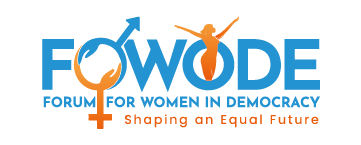The Cost of Women’s Leadership: Reclaiming the Narrative Around Political Participation
The Cost of Women’s Leadership: Reclaiming the Narrative Around Political Participation
A recently circulated piece from an interview with a female member of Parliament, “I am Leaving Parliament Without My Husband but With Huge Loans and Shame,” has stirred public concern for its raw and deeply personal account of one woman’s painful experience in political office. Her story, while emotionally gripping, paints a troubling picture, one that risks reinforcing the belief that politics is a dangerous and shameful space for women.
On the surface, it appears to be a personal testimony of pain and loss, but for me and many other feminists, it reads like something far more calculated: an orchestrated narrative designed to discourage women from aspiring to political leadership, especially at this critical moment when women are preparing to contest in the 2026 elections. I acknowledge that political life, like any form of public leadership, can come with immense personal costs but stories like this, when unbalanced, can potentially roll back the gains registered in increasing the numbers of women in leadership amidst efforts to aspire for parity. Yes, politics can be tough. But so can the corporate world, the media industry, academia, and even the civil service. Patriarchy keeps evolving in the private and public spaces to deter women from reclaiming their voice, choice and power. Women everywhere face exploitation, exclusion, and unrealistic expectations yet we do not tell them to stop working or to retreat into silence. So why should political leadership be any different?
What is even more dangerous is how the story reinforces the feminization of sexual immorality. It subtly paints women as the moral failures of politics, implying that they are seduced, compromised, and ultimately broken by the system. Sexual immorality is not a “women’s issue.” It exists across different work spaces and involves both men and women. It is about personal values and not gender. If anything, these challenges underscore why we need more, not fewer, women in leadership, to push back against the backlash, reshape the narrative but more importantly, centre women and girls’ priorities in decision making. The efforts made towards increasing women’s participation in leadership remain a significant challenge. Women are still under-represented in political and in socio-economic spheres and the 30% affirmative action seems to be the maximum as moving towards 50:50 gender parity remains an uphill task. Although there has been improvement in women’s representation at the cabinet level from 28.7% in 2016/2020 to 45.8% today, majority of the women leaders continue to be physically present, but strategically absent during critical decision-making on women and girls’ priorities. This is no coincidence. It is the result of a broader systemic culture that undermines women’s leadership not only through institutional barriers and tokenism, but also through carefully crafted public narratives like the recent viral story that are designed to shame, isolate, and deter women from wielding real power. These tactics keep women in the room, but away from the table where real influence happens.
Over the past 30 years, organizations like the Forum for Women in Democracy (FOWODE) have been at the forefront ensuring that more women shape policies, influence budgets, and bring transformative leadership into decision-making spaces. The organization has equipped women leaders not just with ambition, but with tools, training, and values to challenge oppressive structures and demand gender responsive policies, laws, and budgets. The leadership work has touched over 30,000 women leaders, who are amplifying their voices and ensuring that their leadership extends beyond symbolic representation to genuine influence in both the public and private spheres. Beyond that, the organisation has mentored over 1000 young women leaders in alternative and transformative leadership. These trailblazers are paving the way for a new generation of bold and transformative leaders who refuse to be silenced, sidelined and tokenized and are using their voices to challenge injustice and push for gender equality. This is not to romanticize the experience of women in politics. In fact, research done by FOWODE, such as Deterred Not Barred, Reality Check: Women in Leadership Positions in Uganda, and Women Shattering the Glass Ceiling, has documented the harsh realities women face. From gendered scrutiny and moral policing to violence and the immense burden of unrealistic community expectations, women in Uganda’s political arena often navigate a deeply hostile terrain. However, we must resist the urge to let individual painful experiences become a blanket indictment of all women’s leadership journeys.
To the women watching from the sidelines, afraid or uncertain, we see you, and we are with you. Your story can be different. There are women who have served with distinction, integrity, and balance. Their voices matter too and deserve much attention. They are proof that it is possible to serve diligently while remaining grounded in healthy and supportive environments / families. To the public and policymakers, support women’s leadership not as a token, but as a necessity for democracy and development. And to those who still believe politics is no place for women, look around. The future is already female. And it is not going away. Uganda deserves leaders who lead boldly and with integrity. Many of those leaders can be women. Let us not silence them with shame. Let us stand with them and build a better political culture, shaping a future where women lead, thrive, and transform society.
About the Author:
Esther Nassali Masanso
Senior Communications Officer
Forum for Women in Democracy (FOWODE)
